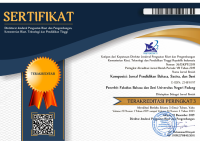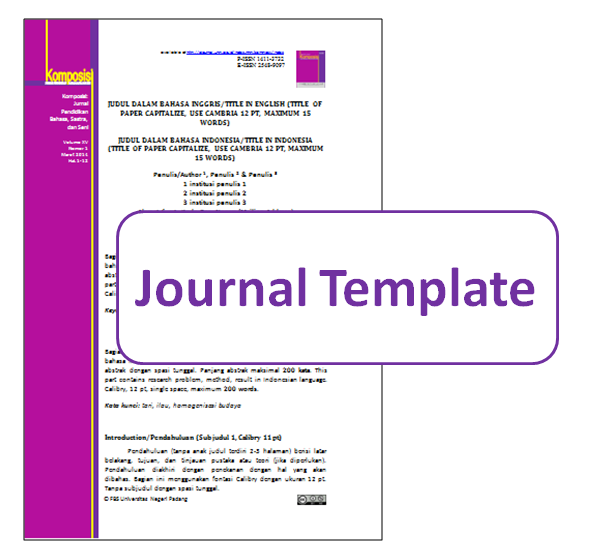Indonesian Civil War: Comparing Discourse In the Campaign of Jakarta’s 2017 Gubernatorial Election
 ), Agustina Agustina(2),
), Agustina Agustina(2), (1) Universitas Negeri Padang
(2) Universitas Negeri Padang
 Corresponding Author
Corresponding Author
Copyright (c) 2021 Komposisi: Jurnal Pendidikan Bahasa, Sastra, dan Seni
DOI : https://doi.org/10.24036/komposisi.v22i1.107644
Full Text:
 Language : en
Language : en
Abstract
Political discourse today is no longer dependent on the performance of the political elite; however, it has shifted to active participation of their supporters. This phenomenon is widely recorded in social media as the background event. Without exception to Jakarta’s 2017 Gubernatorial Election that received an international spotlight because the roar is so massive in the universe of cyberspace. This qualitative descriptive study examined the pattern of campaign movements as a political discourse conducted by the public in supporters community account as a form of public participation in the politics of free-active democracy. It aimed to map out the pattern of discourse movements arising from the supporter community accounts of one of the candidate through the perspective of the discourse comparison offered by Sawirman (2014). The findings show that there are three supporting accounts of candidates which posited as primary, secondary and tertiary discourse. For the configuration of the discourse, gradable adjectives are used as a linguistic strategy to weaken and to dispel sympathy for opposing factions. It is based on the spirit that speakers are superior to their rivals. In general, the pattern of discourse movements identified is synergistic and mutual in order to demonstrate the superiority of their group by degrading the opposing side.
Keywords
References
Adek, M. (2019, January 10). Analisis Perbandingan Wacana Kampanye Hitam dan Putih tentang Jokowi pada Pilpres 2014 dan Pergerakan Wacananya. https://doi.org/10.31227/osf.io/gwhju
Agustina (2017), Politeness in language by the politicians in the discourse of Jakarta election, Proceedings of the Sixth International Conference on Languages and Arts (ICLA).
Ammann, S. L. (2010). Why do they tweet? The use of Twitter by US Senate candidates in 2010. The use of Twitter by US Senate candidates in.
Berelson, B. (1952). Content analysis in communication research. New York: Free Press.
Brown, G., & Yule, G. (1983). Discourse Analysis. Cambridge: Cambridge University Press.
Chiluwa, I. (2008). Religious vehicle stickers in Nigeria: A discourse of identity, faith and social vision. Discourse & Communication, 2(4), 371-387.
de Sola Pool, I. (1959). Trends in content analysis. Urbana: University of Illinois Press.
Digital in 2016 - We Are Social. (2016). Retrieved January 11, 2020, from We Are Social website: https://wearesocial.com/special-reports/digital-in-2016
Djurubassa, G. M. (2017). Partisipasi politik dan demokrasi di media sosial (analisis wacana pada Facebook dan Twitter dalam pemilu presiden 2014), Tesis. Yogyakarta: UGM
Enli, G. (2015). Mediated authenticity: how the media constructs reality. New York: Peter Lang Publishing, Inc
Enli, G. (2017). Twitter as arena for the authentic outsider: exploring the social media campaigns of Trump and Clinton in the 2016 US presidential election. European Journal of Communication, 32(1), 50-61.
Haber, S. (2011). A political campaign message in 140 characters or less: The use of Twitter by U.S. Senate candidates in 2010. American University’s Digital Research Archive.
Habermas, J. (1989). The structural transformation of the public sphere: An inquiry into a category of bourgeois society (trans. Thomas Burger), Cambridge: MIT Press.
Hamid, A. (2014). Jokowi’s populism in the 2012 Jakarta gubernatorial election. Journal of Current Southeast Asian Affairs, 33(1), 85-109.
Merriam, S. (2009). Qualitative research: A guide to design and implementation. San Francisco: Jossey-Bass.
Sadasri, L. M., & Prajarto, M. A. (2013). INTERNET, SELEBRITI MIRO, DAN KUASA Analisis Wacana Foucaultian Chripstory Akun Twitter Selebriti Mikro @TrioMacan2000 dan @Kurawa Masa Kampanye Pilkada DKI Jakarta 2012 (Doctoral dissertation, Universitas Gadjah Mada).
Sawirman. (2005). Simbol lingual teks politik Tan Malaka: eksplorasi, signifikasi, dan transfigurasi. Disertasi. Denpasar: Universitas Udayana.
________. (2014). E135 reader: Media meliput teror. Padang: Andalas University Press.
Semiocast (2012), Twitter reaches half a billion accounts more than 140 millions in the U.S., online: (16 January 2014).
Smit, H. L. B. (2018). 'Minoritas Tau Diri'. A Review of the 2017 Jakarta Gubernatorial Elections. Master thesis. Utrecht: Utrecht University.
Syailendra, E. A. (2017). 2017 Jakarta Election and Indonesia’s Democracy, Jakarta’s Contentious Election: What Anies Baswedan’s Victory Means.
Tapsell, R. (2015). Indonesia's media oligarchy and the “Jokowi phenomenon”. Indonesia, 99(1), 29-50.
Van Dijk, T. A. (1985). Structures of news in the press. Discourse and communication: New approaches to the analysis of mass media discourse and communication, 10 (69).
Walden, M. (2017). Democracy in Indonesia: A cause for celebration. Retrieved from https://www.lowyinstitute.org/the-interpreter/democracy-indonesia-cause-celebration.
Wilks, S. (2017). A complicated alchemy: theorizing identity politics and the politicization of migrant remittances under Donald Trump’s presidency. Cornell Int'l LJ, 50 (285).
Wittgenstein, L. (2013). Tractatus logico-philosophicus (trans. Pears and McGuinness). London: Routledge.
Young, J. H. (2009). International election principles: Democracy & the rule of law. American Bar Association.
 Article Metrics
Article Metrics
 Abstract Views : 243 times
Abstract Views : 243 times
 PDF Downloaded : 29 times
PDF Downloaded : 29 times
Refbacks
- There are currently no refbacks.
Copyright (c) 2021 Komposisi: Jurnal Pendidikan Bahasa, Sastra, dan Seni

This work is licensed under a Creative Commons Attribution-NonCommercial 4.0 International License.











